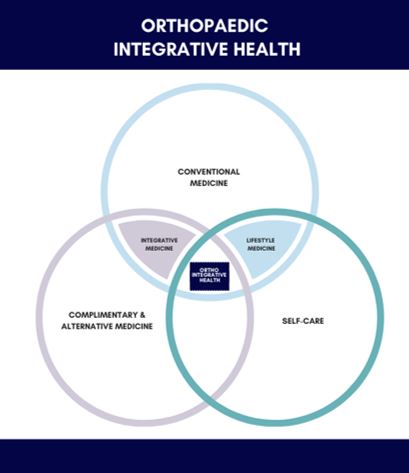Understanding Orthopaedic Integrative Health
What is orthopaedic integrative health? Orthopaedic integrative health does not rely on medications and uses alternates to alleviate pain and build orthopaedic wellness. And in a nutshell, it is the future of personalized orthopaedic care. Orthopaedic integrative health combines conventional orthopaedic care, integrative medicine, and lifestyle medicine. It takes the best from all three fields to help a patient excel. This unique synthesis optimizes recovery from an 
How does Orthopaedic Integrative Health Work?
Once an orthopedist, physiatrist, or sports medicine doctor has evaluated and diagnosed a musculoskeletal condition, a patient may be referred to a specialized physician at the Orthopaedic Integrative Health Center (OIHC). This physician works with the patient to optimize factors that impact orthopaedic recovery and health including nutrition, activity level, sleep, and stress. At the initial physician consultation, a customized orthopaedic health plan is developed to improve recovery, promote wellness, and build a healthier lifestyle.
Where do we see Orthopaedic Integrative Health today?
Many factors are known to slow surgical recovery, promote pain, and result in increased surgical complications. This includes nutrition, activity level, sleep, and stress. In fact, the American Academy of Orthopaedic Surgeons (AAOS) recommends improving these factors before and after orthopaedic surgery to reduce the risk of complications such as infection, bleeding, and poor pain control. This means building a plan for before and after surgery that improves nutrition, sleep, and activity as well having a plan for stress reduction and social support. These factors help reduce surgical risks and support a smoother recovery in the face of a hip surgery, knee surgery, shoulder surgery, neck surgery, back surgery, and other orthopaedic surgeries. An orthopaedic integrative health approach creates a customized plan to address these factors.
Unfortunately, joint, back, neck, and muscle pain are common, and often do not require surgery. These pains can become nagging and often, debilitating issues. Inflammation can drive these pains. The classic signs and symptoms of inflammation are dolor (pain), calor (heat), rubor (redness), tumor (swelling), and functio laesa (loss of function). These are the signs and symptoms of the body’s inflammatory system at work. If you strain your back muscles, you may notice pain, spasms, and swelling. This is your body repairing the area. Initially, these are good signs. But sometimes, even after a medical evaluation and several weeks pass, the signs of inflammation and pain persist. This may mean you need to take action and consider the bigger picture. You may need help lowering your body’s overall inflammation and pain levels. The food we eat, our sleep, our activity, and our stress all impact these levels. The OIHC optimizes these factors to reduce pain and inflammation.
How can I benefit from Orthopaedic Integrative Health?
An orthopaedic integrative health approach builds a personalized plan to tackle orthopaedic pains without dangerous medications. It does so by improving nutrition, sleep, activity, and stress levels which helps lower pain and inflammation. These are not always simple changes and the proper guidance with a customized plan and support make all the difference. This is what the OIHC provides. It gives patients the best chance at a full recovery with less pain and more function. Often, this involves meeting with an OIHC physician to develop a personal health plan and then, meeting with a OIHC nutritionist to iron out a detailed food plan to reduce inflammation and pain. The Orthopaedic Integrative Health Center is committed to improving orthopaedic recovery and wellness by developing a personalized plan that helps you feel better and live better!
Dr. Sharma is a physical medicine and rehabilitation specialist and the Director of the Orthopaedic Integrative Health Center at Rothman Orthopaedics.
Resources & References
1. Orthopaedic Integrative Health Center (OIHC) https://rothmanortho.com/oihc
2. American Academy of Orthopaedic Surgeons (AAOS). Quality & Practice Resources/ Quality Programs & Guidelines/ Toolkits/ Surgical Risk Reduction Toolkit. Accessed Sept. 10, 2021. https://aaos.org/quality/quality-programs/quality-toolkits/?embed_path=modexm%253DEmbedStart%2526toolkit%253DSurgical%252520Risk%252520Reduction%252520Toolkit




